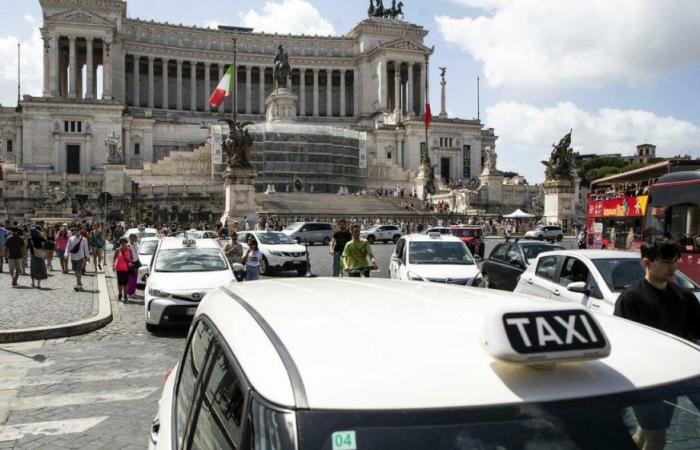Strict restrictions, although milder than expected, on timetables and reservations for Ncc. An “assist to taxi drivers” according to the driverless rental companies and a “useful first step” for some acronyms of the white cars. And again: more controls for everyone, with the start of a public census defined by the government as “anti-illegal”. The three implementing decrees of law 12 of 2019 are ready, written by the Ministry of Infrastructure (Mit), led by Matthew Salvinifor the public transport sector, both scheduled and non-scheduled. The so-called “queue cutters”, which Il Messaggero was able to preview, while in Rome and in the cities of art, citizens and tourists are once again waiting up to an hour to get into a white car. And if the taxi drivers’ front is split, between those who open up to the government and those who criticize it for alleged openings to Uber, the multinational is protesting, while the rental companies with drivers are ready to appeal and strike. This in a climate of maximum tension, between increases in tariffs for white cars (4 cents per kilometer in Milan), and alleged attacks and threats by taxi drivers to NCCs (reported by the association “Sistema Trasporti”).
WHAT DO THEY PROVIDE FOR?
In general, the government’s stated goal is to have more authorizations and more cars on the road. Therefore, it will be easier for users to find a taxi or a NCC thanks to the apps. And, once fully operational, smaller queues, also given the parallel increase in licenses and second drivers in some cities. Rome, but also Milan and Bologna after the Asset decree wanted by the Minister of Enterprise, Adolfo Urso. But in the Emilian capital, the exams to get the KB license are at a standstill, making the new tender inaccessible for many.
The first of the new decrees, on the National Electronic Register of the sector, was signed yesterday, after the approval of the Privacy Guarantor. In the coming weeks it will be the turn of the one on the service sheet for rental with driver (after analysis by the same Guarantor) and then, probably in September, the third on digital intermediation platforms. These are those provided by taxi drivers, but also by multinationals: in addition to Uber, global giants such as Bolt and Freenow. For this decree, the opinion of the Antitrust and the Transport Regulatory Authority is awaited, after an initial rejection, with a report sent to Prime Minister Giorgia Meloni, for risk of violation of the rules on competition.
The National Public Computer Registry (Rent) for taxis and NCCs will serve to create a comprehensive picture of the licenses of the former and the authorizations for the latter. According to the first data, to be confirmed, there are 28,604 taxis and 127,508 NCCs in Italy. The Ministry aims at “an efficient regulation of the market, unmasking the phenomena of illegal activity”. The Registry, which will be accessible to taxi and NCC operators, but also to municipalities, civil motorization offices and control bodies, contains the details of the companies and the data relating to the contracts stipulated. A deadline of ninety days is foreseen for the companies to register in the list, which, after the checks of the ministry, will be fully operational in six months. But it is on the other two texts that the clash between the categories is unleashed.
For NCCs, the obligation to return to the garage between one service and another is foreseen, or a minimum waiting time of twenty minutes (reduced from the thirty foreseen in a previous draft). The reservation can therefore “be registered as a draft service up to twenty thirty minutes before the start of the service”. Up to a moment before the start of the ride, the name of the user who books a rental with driver can be changed, but only “upon express request of the client, on the basis of proven needs”. In short, with a reason that must remain written. Exceptions to the digital service sheet would be foreseen only for NCCs in small municipalities without taxis.
“These measures – thunders Andrea Romano, president of MuoverSì federation Ncc and mobility – are punitive and irrational, identical to those already rejected by the Antitrust and by a ruling of the Constitutional Court against the obligations to return to the garage, which will limit the freedom of movement of citizens and tourists, affecting our sector and the tourism sector”. Hence the announcement of “appeals and strikes”, referring to European legislation. The minimum waiting time does not exist in any other member country. “We have listened to the acronyms and made changes to the texts – respond sources from the MIT – twenty minutes is a physiological waiting time for a ride in a city like Rome”. Further changes are not excluded after a new meeting with all the categories.
However, assistance to the NCCs could still come from the Consulta, which today could declare an article of the same law 12 of 2019 unconstitutional, allowing the release of new authorizations, until now blocked by the absence of the National Registry.
THE CONTROVERSY
Different positions among taxi drivers, among whom, at least for now, a new strike after the one on May 21st is excluded. The texts are partly disappointing, but the crackdown on NCCs is considered positive. “The judgment – says Claudio Giudici of Uritaxi – is sufficient, even if more could have been done. The government is trying to restore legality in non-scheduled public transport, but it is loosening the rules already in place and it is paradoxical that multinationals and illegal operators are complaining”. Other acronyms are harsher. “The executive – according to Nicola Di Giacobbe (Unica Taxi Cgil) – opens and legitimizes intermediation platforms like Uber, without highlighting the difference with radio taxis and our public service, carried out in compliance with municipal rules”. Uber, however, is not happy. For the general manager in Italy, Lorenzo Pireddu, “the government has no strategy, other than punishing the companies of rental with driver to satisfy the requests of a part of the taxis”.
© ALL RIGHTS RESERVED
Read the full article on
The messenger






